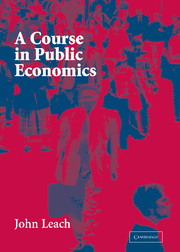Public Goods
Published online by Cambridge University Press: 06 July 2010
Summary
Many of the goods in our economy are rivalrous in consumption, meaning that consumption of a unit of the good by one person precludes consumption of that same unit by another person. Shoes have this property: if I am wearing a particular pair of shoes, you cannot wear the same pair. The goods ale and bread, discussed at such great length earlier, are both rivalrous in consumption.
Other goods are non-rivalrous in consumption, but these goods are much rarer than rivalrous goods. Consumption of a unit of a non-rivalrous good by one person does not preclude its consumption by other people. The classic example of a non-rivalrous good is the lighthouse, whose beam of light warns vessels away from hazardous rocks. If the lighthouse signal can be seen by one boat, it can be seen by all other boats in the vicinity. Knowledge is another non-rivalrous good. Once something has been discovered, one person's use of that knowledge does not preclude others from applying the same knowledge.
Rivalry and non-rivalry are extremes, and there are many goods that lie somewhere between these extremes. Often the degree of rivalry depends upon the number of people using the good. Suppose, for example, that one person is viewing a film in a theatre that seats one hundred people.
- Type
- Chapter
- Information
- A Course in Public Economics , pp. 155 - 156Publisher: Cambridge University PressPrint publication year: 2003
- 1
- Cited by



